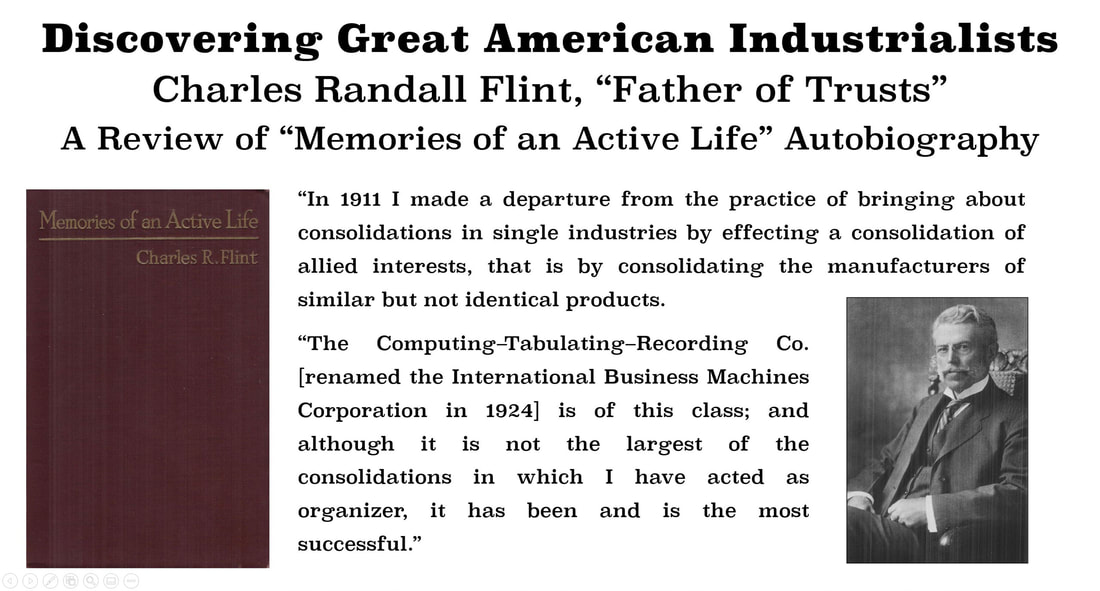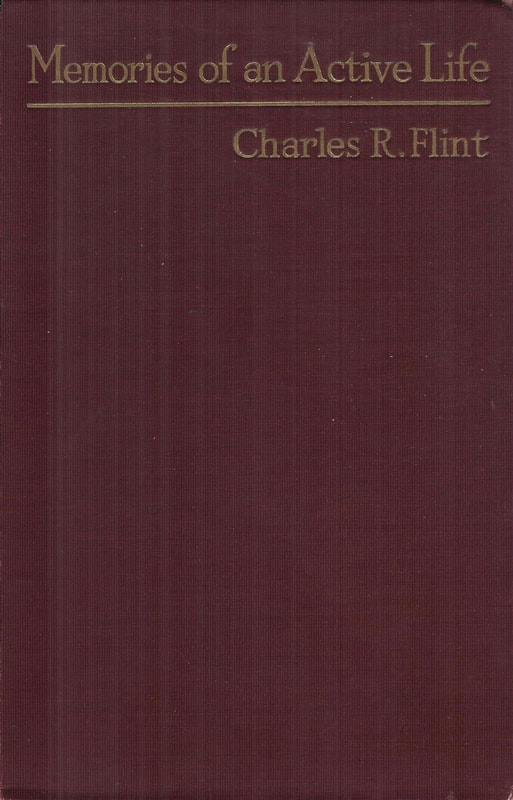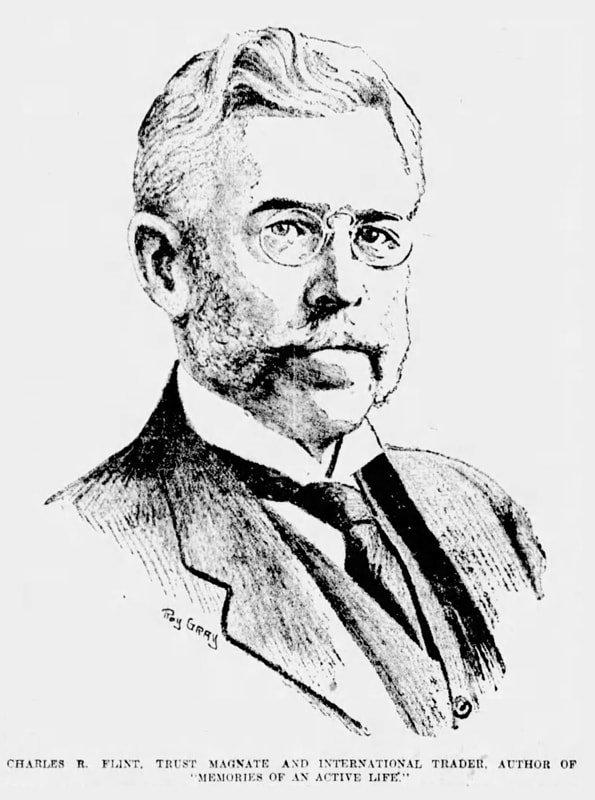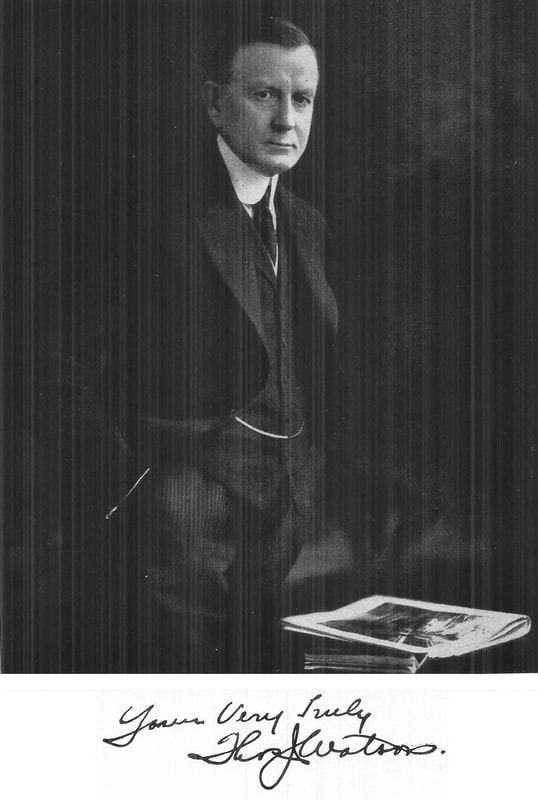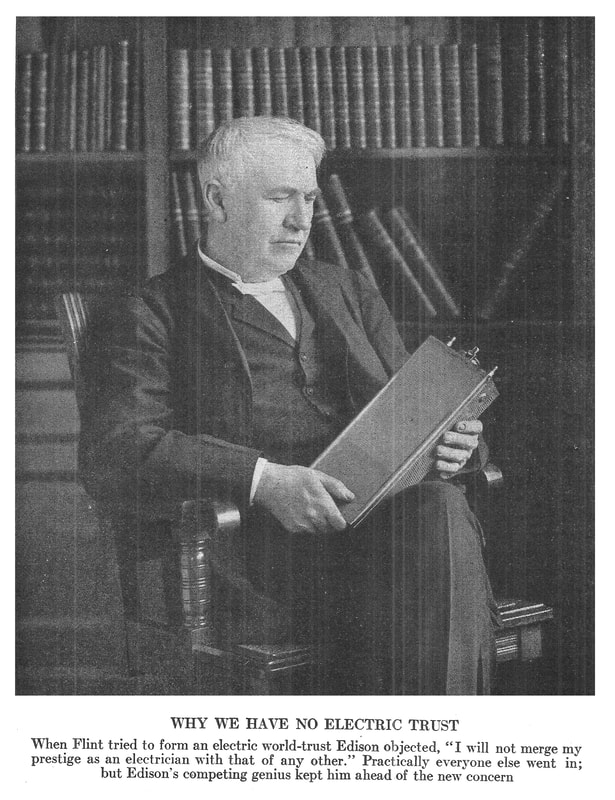A Review of "Memories of an Active Life"
|
|
Date Published: June 23, 2021
Date Modified: April 16, 2024 |
Memories of an Active Life by Charles (Chas) R. Flint is his 1923 autobiography.
Mr. Flint was quite a character and would be called today by many other names besides the father of trusts: entrepreneur, speculator, mercenary, opportunist, arms dealer and more. In this book you find that he thought very highly of himself. He put together one of his most successful trusts—the C-T-R Corporation—yet had to hire an individual from the outside to save the acquisition when it wasn't working as designed.
He is fortunate to have chosen Thomas J. Watson Sr., who, at forty years of age, started an iconic, four-decade-plus journey with the company while newly married with his first child on the way.
Mr. Flint was quite a character and would be called today by many other names besides the father of trusts: entrepreneur, speculator, mercenary, opportunist, arms dealer and more. In this book you find that he thought very highly of himself. He put together one of his most successful trusts—the C-T-R Corporation—yet had to hire an individual from the outside to save the acquisition when it wasn't working as designed.
He is fortunate to have chosen Thomas J. Watson Sr., who, at forty years of age, started an iconic, four-decade-plus journey with the company while newly married with his first child on the way.
A Review of "Memories of an Active Life" by Charles R. (Randall) Flint
- Reviews of the Day: 1923
- Selected Quotes from "Memories of an Active Life"
- This Author’s Thoughts on Charles R. Flint and His Memoir
Reviews of the Day: 1923
|
Most of Mr. Flint's active business has been with belligerents of one kind or another. Wherever there was trouble, Charles R. Flint smelled out business—in China, in Turkey, in Russia, In North Africa, anywhere—it was all the same to him. He had audiences with Sultans, Czars, Emperors and their subalterns [subordinates] and helped them straighten out some tangled bit of business connected with war. … His integrity was above criticism.
The Boston Sunday Globe, December 23, 1923
The reader of "Memories of an Active Life" will not believe that Mr. Flint has ever known a dull day; certainly there is not a dull page in his book.
Chauncey Elwood Sanders, Books and Writers, Austin American Statesman, May 11, 1924
|
Editors note: From reviewing the papers of the day, this book appears to have been highly advertised but little reviewed when compared to the number of independent reviews of the biography of George Eastman when it was released six years later.
Selected Quotes from "Memories of an Active Life"
On the Building of Trusts
"A combination of labor is a trades union, a combination of intelligence a university, a combination of money a bank—a combination of labor, intelligence and money is an industrial consolidation—Work, Brains, and Money."
Editor's note: This excerpt and the speech he started it with earned him the title "Father of Trusts."
C-T-R Company Was an Experiment
"The proposed 'allied consolidation,' instead of being dependent for earnings upon a single industry, would own three separate and distinct lines of business, so that in normal times the interest and sinking funds on its bonds could be earned by any one of these independent lines, while in abnormal times the consolidation would have three chances instead of one to meet its obligations and pay dividends."
The One Major Downside of the C-T-R Company "Trust"
"All the advantages of industrial consolidation which I have enumerated are secured by an allied consolidation, except that a centralization of the sales department cannot always be effected to the same extent as in the case of consolidated companies that manufacture a single product."
Editor's note: This was a long-term problem at IBM. Tom Watson suffered with cross-training individuals calling on small mom-and-pop retail businesses to sell meat slicers and candy scales, individuals selling time clocks to schools and cities, and tabulating-machine salesmen selling to railroads, insurance and banks. At times, he was encouraged when individuals from the three different organizations would share possible contacts and leads.
On Rendering "Services" for Payment
"Monarchies are somewhat shy on sonorous [having a deep, pleasant sound] phrasings of the principles of liberty and justice and all that, but they do pay their bills rather well; republics, on the other hand, like many eminent philosophers, have a distaste for such sordid affairs."
This Author’s Thoughts on Charles R. Flint and His Autobiography
Looking Elsewhere for Insights
|
I found it interesting that so few reviews from 1923 criticized Chas Flint for his arms dealings. They focused mostly on the word "active" and how much "fun" this man had in his life. The country, though, had just exited from the Great War and survived the Recession of 1920-21 in its aftermath. So, I turned to Mark Sullivan's Our Times to get any insight I could from a journalist who was perceived as a "conservative" reporter in his day.
This is what Sullivan wrote about trusts in general and Flint in particular:
"Most of the trusts were organized by promoters not associated with the industries on which they conferred their attentions. The man who was called the 'father of trusts,' Charles R. Flint, said that this was indispensable, that a combination could not successfully be brought about by a man within the industry, that the promoter must be, in Flint's phrase, a 'disinterested intermediary.' …
"As a rule, the only industry with which the promoter was identified was the manufacture and sale of securities." |
Image of Charles R. Flint from 1924 believed to be in the Public Domain.
|
This pretty much captures Flint—put deals together and move on. There is not a word about his arms dealings. Sullivan doesn't focus on Flint as a historic character of this time frame.
Comparing Flint and Watson Sr.
|
One author has insinuated that Charles R. Flint and Thomas J. Watson Sr. were close friends and "cut from the same cloth." By comparing the information in this book with George F. Johnson's Industrial Democracy, and Watson Sr.'s Men-Minutes-Money and Human Relations, it becomes evident that this is ludicrous.
Watson Sr. always gave credit to those around him; Charles Flint, did not. Like one of Watson's predecessors (George Eastman) Watson Sr. refused to profit from munitions production during World War II, while Charles R. Flint traded in munitions from conflicts between nations. Watson Sr. fought for peace, Flint profited from international conflict. Watson Sr. stayed with corporations he joined such as NCR and IBM in an attempt to mold them into better, long-term institutions of business, while Charles R. Flint put together trusts, frequently loaded them with water (goodwill and other intangibles) and generally hoped for the best. |
|
There is little to associate Flint's internal character and Watson Sr.'s. One way to look at their relationship is that Charles R. Flint created opportunities for Watson Sr. and others to join what was the 1920s equivalent of "corporate start-ups" and do something with them. Their historic intersection is a single point in time when Chas Flint hired Watson Sr. to save a deeply troubled C-T-R Company.
Although Charles R. Flint believed that Tom Watson Sr. was one of history's greats, it is not at all apparent that Watson had the same opinion of Flint, and as was Watson's character he rarely said an "unkind word." More often than not, a researcher of Watson Sr. has to rely on "the lack of comment." These two individuals were almost diametric opposites, but both served their unique purpose in the founding and saving of the C-T-R Company which adopted the name "IBM" from its Canadian subsidiary in 1924. This book might be a more interesting read the second time around … but that second time will have to wait for a while.
Cheers, - Pete |
Why there was never an "Electric Trust." Select image to read caption.
|
